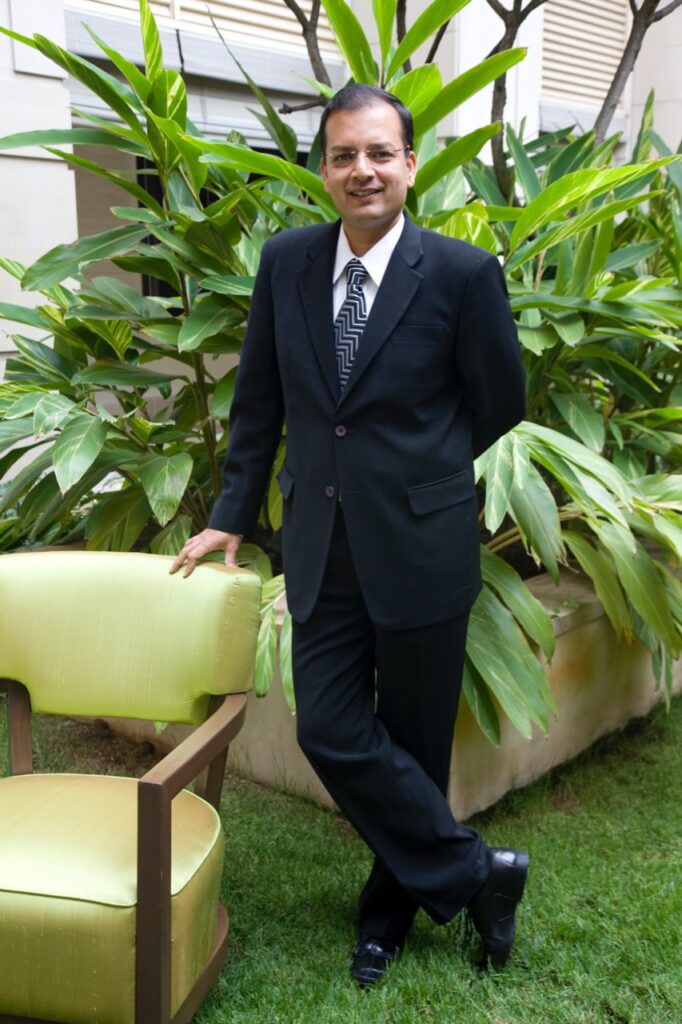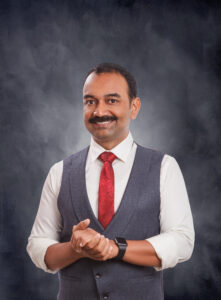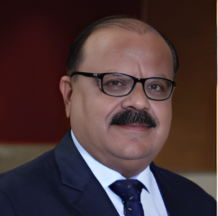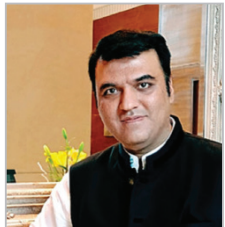Ramiah Daniels, Director, Hospitality Paradigm

Ramiah Daniels, born and brought up in Bombay in the initial two decades of his life, started his career with Oberoi Hotels at the Oberoi Centre for Learning and Development (OCLD), Delhi. After completing his 2 year management program he was posted to Oberoi Hotels, Mumbai in the Food & Beverage (F&B) department. 6 years later, now a Manager – Food and Beverage, Ramiah decided to move on to smaller organisations as a General Manager. His decision to leave was based on the fact that he wanted to see the outside and relatively unstructured world within the hospitality sector. He worked with three organisations over the next 6 years, two of which included operating an upscale Restaurant & Bar with significant banquets in South Mumbai (Starters & More) and North Mumbai (Venue), and one which involved the opening of a Sarovar hotel in Surat (Lords Park Inn).
It was through this period that his learning was enhanced greatly. He opines, “It is far more difficult to manage standalone restaurants and budget hotels than to manage luxury hotels for in the latter, everything is generally set. Your departments are all in place. At Oberoi hotels, where everything ran smoothly, all you had to do was to operate it. While you are servicing the guest there are many internal departments servicing you, but when it comes to the smaller hotels and standalone restaurants, one has to create and set the SOPs oneself. You have to roll up your sleeves and get things done yourself. I have a lot of respect for standalone restaurateurs for theirs is a tough life. You have got to do a lot of things yourself and it teaches you to be street smart.”
Yet, somewhere during these 6 years, Ramiah felt that he was not utilising himself to the kind of potential, grooming and background that he came from. So, with the experience he gained in the smaller segment, he decided to apply his new learnings back in the luxury segment.
“I truly believe that people in this industry should always experience both sides of the coin, be it luxury or other segments, as well as the experience of working in city hotels as well as resort hotels.”
Ramiah joined The Leela, Goa as a F&B Manager and was subsequently promoted to an EAM F&B. In his 6 years here, he realised that there was a lot to learn in the luxury resort segment, as his experience thus far at Oberoi Hotels was in a business (city) hotel. The clientele (specifically their state of mind), marketing and operations of the hotel are quite different. In resorts, the business cycles with their peaks and troughs are quite differentiated than those of city hotels.
Ramiah then moved on to Mumbai as a General Manager of Gordon House Suites & Waterstones Club & Spa – a luxury brand at the international airport area. Subsequently he joined Bharat Hotels as the General Manager of the Lalit hotel in Bangalore. After over 2 years at The Lalit Ashok Bangalore, now with 23 years of diverse hospitality experience in his hands, he was able to clearly identify his professional purpose in life. He had an intense desire to develop and mentor people within the hospitality industry. “I grew very passionate about it. This is a particular trait that I see lacking in many managers. They may say they like to develop teams, but the jury is out for how many actually implement this desire.”
“Halfway through my career, I began to realise that the greatest joy is to see people develop under you. It gives me immense joy when my ex-associates connect with me and say ‘I learnt this because of you and I still remember it.’ The fact that someone has spent his/her time mentoring them so that they can learn and develop, is something an individual will not forget. I give credit for this to the grounding I received at the Oberoi Group – for the way they train us at the school and the way they teach us how to keep developing our staff is truly something that defines an Oberoi manager.
So in 2011, I decided to start my own company Hospitality Paradigm. My partner, Rajan Parulekar, a Professional Sales Trainer and I, started it essentially with the thought that it will be an offline learning and development platform for sales and behavioural training for managerial segments in the hospitality service industry.”
Over the past 9 years Hospitality Paradigm has matured into a consulting company where the company now develops learning modules for organisations, conducts online & offline sessions for managerial teams in Sales and Operations, creates SOPs and brand standards, identifies and advises and does senior resource placements, performs operational and mystery audits, and also consults and guides sales teams and other departments within hotels. All of this that Hospitality Paradigm does works towards developing people which is the underlying passion of the founders.
The people Ramiah works with often ask him one question, ‘Do you ever regret leaving the Hotel Industry?’
His answer is very clear. He says to then, “Firstly I have never left the industry, as I am working with the industry. If I had continued in active operations, perhaps by now I would be a Vice President managing 4-5 properties; but my knowledge base would still be restricted to that one brand itself. Today I go to different parts of India where the Owners or General Managers sit with us and brief us and share their concerns with us. While we are staying at their hotels during our programs or consulting visits, as an hotelier, I observe and grasp a lot. My umpteen years of experience is engraved within me. So even if I go for a holiday I automatically observe things. It just comes naturally to oneself. Hence, the observation and learning thereof, of so many diverse hotel operations and hospitality organisations is so much more than what I would have gained as a General Manager or a Vice President for one brand.
Secondly, one has to understand the stress a General Manager goes through and the fact that when things go right, kudos may never always come their way; but when things go wrong they are held totally responsible for it.” Keeping this in mind, Ramiah felt that it was better to operate his own business and accept the brickbats and bouquets that come his way as they are directly related to his efforts and application… essentially, you get what you deserve when you have your own enterprise, as opposed to working for one.
When asked what, in his opinion, are the three biggest challenges in the day to day functioning of a hotel, Ramiah expressed that the primary challenge is that Hoteliers have Several Bosses. “In the organisational hierarchy, there could be more than one person an hotelier is answerable to. Furthermore he/she is also answerable to his/her guests. So the fact that every customer as well as every manager has to be handled differently involves diverse human soft skills. It is difficult to impart this skill entirely through training, as people handling is something that also needs to be intrinsic within the individual.
The second challenge is the Numerous Windows of Guest Interaction one works with. These windows are tough to template accurately. They must be perceived as windows of opportunity to delight. The hotel industry has a very high number of such interaction windows. With respect to F&B itself the restaurant dining experience may have 30+ interactions with just one guest. Don’t forget you are also simultaneously serving many other guests at the same time!
An example of this would be when the guest calls to reserve a table – the first interaction. The second interaction would be at the vehicle security check at the main entrance gate, the third would be with the valet parking attendant, then the security and the doorman at the hotel entrance… and so on and so forth. Now, until the doorman you already have 5 touch points where the guest may have been disappointed or delighted, and the guest is barely entering the lobby now. From the lobby till the restaurant there are other touch points that come into play. In all, there could be 6-10 touch points even before a guest reaches the restaurant – and each one could lead to a disappointment if not handled correctly. Before a steward or a captain handles a guest there are chances that the guest may already be irritated at the services provided thus far. If that is so, then the steward now needs to work hard to move the guest’s mood from negative to stable and then to a positive. However, the steward may not know this until and unless the guest expresses it… but then again, very few customers express their mood to the steward. So the sheer number of windows of interaction is a challenge by itself.
In order to have a high rate of delightful interactions, service staff need to intrinsically also be behavioural psychologists. They should be able to read body language, understand it, and then act accordingly. Employers/recruiters get carried away during the selection process with the education, experience and personality, or the fluency of the candidate over a language during the recruitment process. But if the candidate does not have the aptitude or the attitude towards hospitality they are not going to make effective ‘guest delighters.’
The third challenge within the hospitality industry is Salary levels. In India, barring very few positions and a very few companies, salaries are yet not commensurate to the hours, the sacrifices and the efforts put in. The hospitality industry has tried to rectify it, but it is difficult, as this is a highly labour intensive industry requiring a lot of human interface. Today, to add salt to this wound, Covid-19 is also changing the outlook on employee numbers, and we are now being forced to look at payroll differently. The pandemic reaction is already making salaries more competitive and this is sad for the people who are working in this industry, since it is one of the hardest hit. Salary bands across levels will have to look at a 20 to 25 % decline over the next couple of years as top lines are going to drop by 25-40% during this period.
The fourth challenge is maintaining high Motivation levels. This has to be nurtured mainly by one’s own self, for in the service industry these motivation levels can swing up and down like the Sensex. You have a good day and you are highly motivated, and vice versa. If you are waiting for your boss to motivate you, forget it. Do not expect this, for everyone is working under pressure and as you go higher up in the chain of command the stress is more. Hence, motivating self is more important. Learn to pat yourself on the back instead of waiting for your boss to do so.”
When asked what his vision is, Ramiah replied, “From a professional perspective, whatever I do or teach others should have a positive impact on their professional or even their personal lives. Size and growth of the business is something that everybody wants. For me it is more about developing people and having people out there say at some stage: ‘Thanks to Ramiah Daniels, I am here today’, or ‘We remember what he taught us.’ That gives me the greatest joy and that is the vision I work towards.”
To the youngsters and readers he counsels, “Care for yourself, your physical and personal life. Don’t lose your soul. A lot of people, especially in this industry, lose their soul and their lives are ruined. Such individuals think they are achieving a lot in terms of numbers for their organisation or in terms of salary but they lose their soul in the process. So care for yourself and your customer, and your co-workers at all levels. At every stage, see how you can help people and how you can add value to their professional careers and develop them.
A holistically successful hotelier truly cares for the customer and tries to see things from their perspective. This is easier said than done. If I ask someone what is empathy, they will say, ‘Putting one’s own self in the shoes of the other.’ But do you know what you have to do for that? You have to remove your own shoes first and then you have to step into the other person’s shoes. This is what people don’t do. They say they understand, and that they empathise; yet the customer very often post interaction, feels that he/she has not been understood.
One of the greatest learnings that we impart to hoteliers is not to look at guests as money spinners. Look at it from the perspective of how you can help that particular client. It is when you try to help the client that he will give you his patronage and thus grow your business.
Try to be noble in your thinking. We all are generally selfish in our lives. None of us are above it. We tend to think ‘What’s in it for me?’ When we are selling we are thinking of our incentives or increments or we are thinking of even retaining our job. We rarely think about whether the client may require the product or service we are so desperately trying to load onto them.
We hear phases like ‘a great sales person can sell a comb to a bald man’ or ‘an efficient sales person can sell a fridge to an Eskimo.’ Very often, these are viewed as positive phrases in the industry but people do not understand that these would be one-time sales. Also, in today’s day and age the customer would realise he has bought something he/she did not actually want, and would vent his/her frustration through a negative review on TripAdvisor and social media, causing more harm than ever.
What we want is a customer for life. Deal with your customers in such a way that they come back to you again and again.”
About the Author
Ramiah Daniels, (Director, Hospitality Paradigm – a hospitality consulting company) is an alumnus of the Oberoi Centre for Learning & Development with over two decades of operational expertise in the hospitality industry, including significant tenures with Oberoi Hotels, Leela Palaces & Resorts and Lalit Hotels.
An Economics major, Ramiah has attended professional development programs with Cornell University and IIM-A. His nurturing and creative management approach has won him much loyalty and respect from teams he has led in the past and this has further fuelled his desire to mentor outstanding hoteliers with professionalism, passion & integrity for their jobs.












Leave a Comment